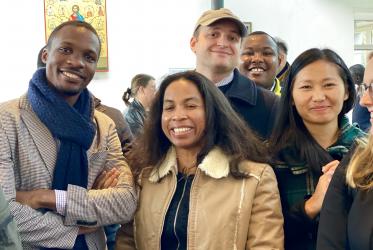This reflection was originally presented during morning prayers in the chapel of the Ecumenical Centre.
Yesterday evening, I extracted some mustard seeds for you from a jar of “Moutarde à l’Ancienne” to show you how tiny they are. I also found a picture of a mustard plant to illustrate how big and sturdy the leaves become, once it’s grown.
When I did some research on the internet, I read to my surprise that the mustard seed is not only mentioned in Christian Scriptures but also in Jewish, Muslim and Buddhist texts!
In Jewish texts the universe is compared to a mustard seed to demonstrate the world’s insignificance and to teach humility.
The Quran speaks of scales of justice which will be placed on the Day of Resurrection and will register wrong even if it should only be the weight of a mustard seed, and in the Hadith, Muhammad is quoted to have said that he who has in his heart the weight of a mustard seed of pride would not enter Paradise.
Buddha on the other hand stated that if a person were to pick a single mustard seed every hundred years from a seven-mile cube worth of mustard seeds, then by the time the last seed is picked, the age of the world cycle would still continue (according to Wikipedia someone has calculated that if a mustard seed is 3 mm in diameter, this would take 936 quintillion years, 68 billion times the age of the universe!).
Jesus mentioned the mustard seed many times. He said that if we had only faith the size of a mustard seed, we would be able to move mountains, and he compared the Kingdom of God to a grain of mustard seed that, when planted, grows and becomes the largest of all garden plants.
In Luke 17 he also said that the Kingdom of God is among us. So, if you have a little time today, just take a few moments to think about how we, in our daily work and ministry in the Ecumenical Centre, in our projects, programs and in our life with our colleagues, can plant tiny mustard seeds of love in such a way that they not only grow into big plants, but into plants that flower and produce new mustard seeds. In this way, each of us can spread the love and make a tiny but growing contribution to establishing the Kingdom of God on earth.




